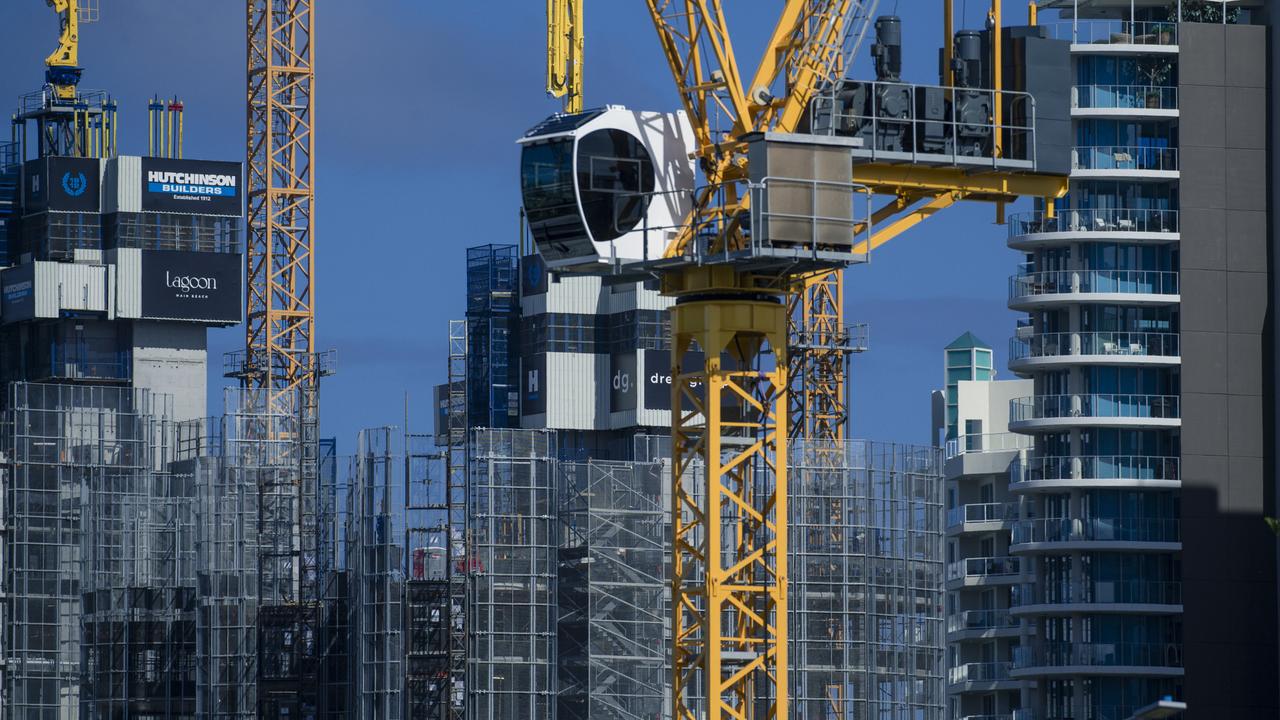Star auditors raise red flags over liquidity amid Queen’s Wharf cost fears
Star Entertainment Group’s auditors have raised red flags about its ability to continue as a going concern with expenses related to the new Queen’s Wharf casino precinct a key concern.

Business
Don't miss out on the headlines from Business. Followed categories will be added to My News.
Star Entertainment Group’s auditors have raised red flags about its ability to continue as a going concern with expenses related to the new Queen’s Wharf casino precinct a key concern.
Star in its annual report released after the market closed on Monday warned earnings uncertainty arising from loss of market share, financial crime remediation and the impact of casino operating reforms cast significant doubt on the group’s ability to continue in business.
The phased opening of the $3.6bn Queen’s Wharf project in Brisbane, which had faced cost overruns and delays, also would continue to dog the company.
“A phased opening of a property of this size and scale causes uncertainty in the time frame it may take for earnings and cash flows to grow to a level where assistance is no longer required from its owner,” Star said in the report. Star is a 50 per cent owner in the Destination Brisbane Consortium that owns Queen’s Wharf.
“The group has capital commitments in relation to future construction which needs to be funded and has associated risks such as delays and increased costs,” Star said.
Auditors Ernst & Young said these issues and others added up to material uncertainties about the company’s future.
The group had non-current assets amounting to $1.409bn as at June 30, 2024, but an impairment expense of $1.438bn was recognised for the year. The annual report revealed former chief executive Robbie Cooke received $5.124m last financial year, including a $1.6m contractual payment in lieu of notice.
Star Entertainment Group’s shares are expected to remain under pressure amid analyst downgrades and lingering doubt about its liquidity.
Star Entertainment chief executive Steve McCann and chief financial officer Neale O’Connell will meet sell-side analysts this week to promote the beleaguered casino operator’s $200m financial rescue package announced last week.
Any share price recovery is likely to remain fragile after Star was hit with analyst downgrades following last week’s debt deal and revelation about ongoing liquidity challenges. Analysts at Barrenjoey cut the stock’s rating to neutral while CLSA cut to hold.
Star shares slumped 44 per cent to 25c on Friday when the stock resumed trading after a near-one month suspension following the delayed release of its annual results.
They staged a partial rebound on Monday, rising 18 per cent to 30c, but are still down more than 52 per cent over the past year.

Star late on Friday formally responded to a show cause notice issued by the NSW Independent Casino Commission that could result in the loss of its Sydney casino licence and a $100m fine. The notice followed findings of regulatory failures by Adam Bell SC in his second inquiry into the company this year.
Star reported 2024 losses of $1.69bn after $2.44bn in red ink in the prior corresponding period, as it continued to battle regulatory costs and challenging trading conditions. Mr McCann is looking to slash up to 350 jobs and offload hotels and other assets after warning the company was “on its knees.”
Morningstar analyst Angus Hewitt said the rescue package meant Star had some “breathing room” and had bought itself time to secure a stronger financial position. But he said there was still a lot of uncertainty and investors should demand a wide margin of safety. Risks include a looming capital raise, a possible $300m fine by financial crimes watchdog Austrac and continuing uncertainty about whether Star can retain its casino licences in Queensland and NSW.
He said while Star now had $534m in debt facilities – $84m more than previously – it attracted a 13.5 per cent interest rate.
“Weaker discretionary spending has resulted in reduced gambling, and Star is losing share, particularly in premium gaming rooms,” he said.
“Operational costs are mounting, especially in risk and compliance as the casino works to salvage its licences.”
The introduction of mandatory carded gaming at Star’s casinos in response to money-laundering concerns also was expected to hit the company’s bottom line. With carded play, punters set gambling limits they can’t change for 24 hours and get an email each month stating how much they have lost.
“Carded play is having a bigger impact than expected,” Mr Hewitt said. “Since its limited introduction in Sydney on August 19, daily average revenue is down 11 per cent for mandatory carded play and $5000 cash limits compared with the four weeks prior.
“This will be rolled out to the entire Sydney casino by October 19 and cash limits reduced to $1000 by August 19, 2025. While the timing of the carded play rollout in Queensland is uncertain, we expect a similar impact.”
CLSA analysts Justin Barratt and Oliver Ridge said they still saw underlying value in Star’s property assets, including the Queen’s Wharf precinct, but there were still “significant concerns” about the company’s overall liquidity position.
Star faced considerable cash outlays including further contributions to the DBC. Other risks included the Austrac fine, unpaid casino duty, legal action and another fine from the NSW regulator. “All the while financial performance remains weak,” the analysts said.
Star said it had made further submissions to the NICC about the progress of its remediation plan, its current financial position and its proposed plans to address financial issues.
More Coverage
Originally published as Star auditors raise red flags over liquidity amid Queen’s Wharf cost fears





